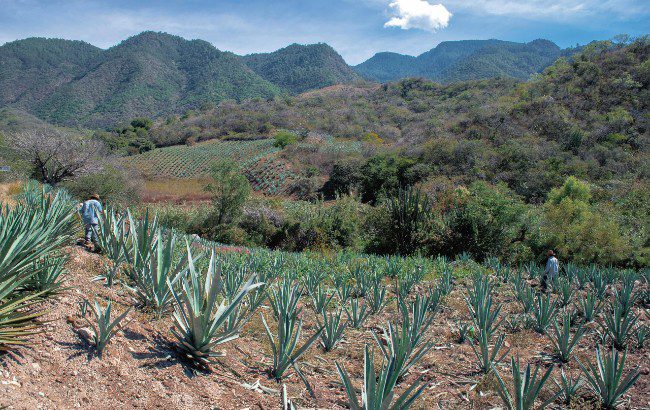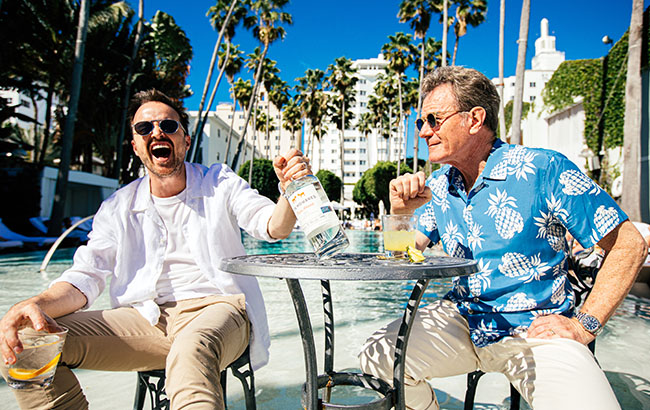This website uses cookies so that we can provide you with the best user experience possible. Cookie information is stored in your browser and performs functions such as recognising you when you return to our website and helping our team to understand which sections of the website you find most interesting and useful.
Is the industrialisation of mezcal inevitable?
As mezcal becomes more popular, will the category submit to industrialisation to meet increased demand?

*This feature was originally published in the February 2023 issue of The Spirits Business magazine.
Success inevitably comes with its share of challenges, particularly for a spirit such as mezcal that’s rich in tradition, and associated with artisanal production methods that don’t necessarily scale up easily to meet rapidly growing demand.
There are perhaps some lessons, even cautionary tales, to be learnt from Tequila, but in some ways mezcal is unique, and so are some of the hurdles it’s facing. The hype for mezcal is real, but it remains a fraction of the size of Tequila. According to IWSR Drinks Market Analysis, in 2021 global mezcal volumes were 3% of those of Tequila.
But the category is growing fast. IWSR figures show an increase of 38% in global mezcal volumes from 2020 to 2021, and it forecasts a compound annual growth rate increase of 13% from 2021 to 2026.
This is excellent news for producers, but it has also meant a lot of change in a relatively short space of time. Producers are all too aware of the sharply rising demand and the multinationals have taken notice too, becoming increasingly involved.
It’s all change in mezcal – the trick is to ensure the change is positive, and maintains the characteristics, both in terms of product and perception, that earned it all this success in the first place. “Mezcal is still a new category, and wasn’t expecting the growth it is experiencing,” says Carlos Moreno, founder and CEO of Koch El Mezcal. “This has created a scenario of uncertainty, and many assumptions.”
Jose Luis Hermoso, research director at the IWSR, provides some context. “Five years ago there were only two facilities producing mezcal on an industrial scale,” he says. “Since then multinational investment has been enormous, and more industrialisation of the category will be needed to supply expected growth.” There are already signs of this industrialisation but, unsurprisingly, approaches vary widely, as do opinions about its inevitability.

“We don’t consider industrialisation necessary for the category to continue to grow, but rather optimisation,” begins Fausto Zapata, co‐founder and CEO of Mezcal El Silencio, who describes the sector’s production process as “an inherently artisanal practice that represents a deep respect, sense of honour and tradition attached to generationally‐owned family businesses”. Zapata outlines the optimised processes at El Silencio, such as a motorised tahona – the large stone wheel that crushes the agave plants – that operates on solar power, but he emphasises the distillery’s hands‐on approach, and involvement in every step of the process.
Zapata contrasts this with what he sees as an industrialised approach in which “mezcals are commonly made by third‐party producers who then sell their finished goods to a larger company in the US, or anywhere in the world”. He believes that this process “lacks the necessary checks and balances to ensure your producers and the people who work on your brand are taken care of, or that the agave is sourced in a proper and sustainable manner”.
Good news
There’s cause for optimism embedded in mezcal’s regulations, believes Eduardo Gomez, sales director of Mexican food retailer Mexgrocer, and founder of Ojo de Dios mezcal. “There will definitely be more industrialisation in the process as a consequence of demand, but the good news is that if mezcal is artisanal or ancestral by DO [denomination of origin], producers must follow the process in the regulations that have been established by the NOM [official Mexican standard],” he says.
Moreno has seen a change in this regard. “There are brands that no longer handle the concept of artisanal mezcal because they know where they are headed, and they need industrialisation to keep up with the demand,” he says. Ivan Robles, finance director for Derrumbes Mezcal, takes a balanced view when it comes to weighing up the pros and cons of the industrialisation of the category. “It’s everywhere now, with big corporations focusing their energy in terms of efficiency and costs, and I don’t think this is a bad thing,” he says.
“They help the category to expand, and bring in more mezcal drinkers.” Robles acknowledges that this comes with some challenges of its own, however. “The big corporations, having lots of money to buy agave, are starting to hit the agave prices. For those of us that focus on conserving traditions, this represents higher costs.”
The increasing involvement of big players in the mezcal industry has a variety of implications, potentially both positive and negative. “Major multinationals now have interests in mezcal brands, which has meant increasing investment in plantings, production capacity, more planning and modern marketing tools,” says Hermoso. “With multinational involvement, the category has had to rapidly adapt to a more demanding environment in terms of quality standards, marketing, planning and execution of sales programmes.”
In 2019, Constellation Brands acquired a minority stake in El Silencio. Zapata sees the potential pitfalls of investment by multinationals into the category but highlights the benefits too.
“It is our belief that the category should minimise the practice of outsourcing to multinationals who turn a blind eye to [ a lack of] proper production practices, as it will only push industrialisation, compromise agave supply, and burden producers,” he says. “If, however, multinationals provide support and visibility to proper production practices, then it is highly beneficial. Not only can they support the increase of mezcal supply through proper artisanal optimisation practices, but they can shed light on all the hindrances that, if not checked, will only compromise the healthy growth of the category in the long run.”
Outright industrialisation, meanwhile, has the potential to put mezcal’s reputation as a handcrafted and artisanal spirit at risk. As Moreno puts it: “The beauty of mezcal lies in its unrepeatable imperfection.”
Gomez offers a cautionary tale: “Industrialisation would have a very bad impact. This has already happened in Tequila 20 years ago, when the category started to be in high demand, and producers implemented industrial practices, and the creation of the mixto category.” The result, he believes, is an enduring negative perception of the category by a significant number of consumers in the UK and Europe.
Hermoso agrees the considerations are not only practical, but could impact how the category is perceived. “Vast industrialisation of mezcal would mean more competition on price to gain share but could also impact the perception of mezcal as the ‘craft spirit of Mexico’, opening the door to other Mexican spirits such as raicilla, bacanora, or sotol.”

Fortunately, mezcal is in a good position to maintain not only its image, but its traditional methods and heritage too, and it has no shortage of brands committed to this goal. For Moreno, Koch’s 14 years of experience and the fact that it is a fully Oaxacan brand are points in its favour. “We have learned to plan, with a focus on where the category is moving forward,” he says. “We have the necessary supply of agave plants to meet demand. We’re a brand that organically has an agave future.”
Another brand with a plan is Bruxo. “We have a long‐term vision for supporting the growth of our business and practices,” says European brand manager Anne‐Sophie Vacher. “We insist that all of our artisanal production processes are preserved, and that we continue in a sustainable path.”
It is not the only brand focused on sustainable practices, as Jaye Iwanowski, director at UK distributor Identity Drinks, confirms. “At the luxury end of our mezcal portfolio, the brand owners of Dos Hombres have ambitious plans to hold true to their original handcrafted methods, with a dedicated focus on sustainability.” Dos Hombres was founded in 2019 by Breaking Bad stars Bryan Cranston and Aaron Paul, with Constellation Brands owning a minority stake in the brand.
More generally, when comparing the category with Tequila, mezcal has a few advantages, which will serve it well as it continues to grow. Hermoso says: “Price per kilo for agave for mezcal remains far lower than for Tequila, and the fact that mezcal can come from different Mexican states and from different agave species, as opposed to only Blue Weber for Tequila, gives mezcal an edge of flexibility compared with the much larger Tequila category.”
Size advantage
There’s also the advantage of the sheer size of mezcal’s geographical region to consider. “Despite the growing demand for Mezcal, the reality is that the territory of mezcal’s DO is the biggest in the world, with over half a million square kilometres,” says Gomez.
“It’s not close to saturation, but new brands will need to look outside of Oaxaca, where maybe 85% or 90% of mezcal is produced at the moment.”
This is compatible with the approach taken by Derrumbes, which produces mezcals from seven states. “Each bottle represents a single state, and each one was chosen to highlight the traditions, the terroir and organoleptic style of the region where it was made,” says Robles. “As the category grows, so does the interest in exploring different brands, states, and types of agave.”
There are undoubtedly challenges ahead as demand continues to rise. Time will tell whether mezcal is able to grow sustainably and maintain its appeal as a traditional, artisanal spirit – but it certainly has what it takes.

